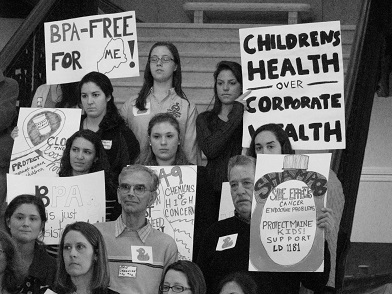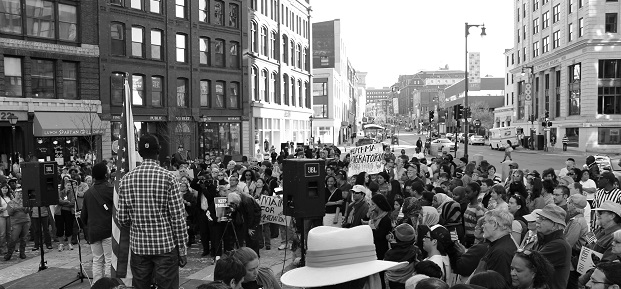Submitted by andrew.francis on Thu, 07/03/2014 - 12:21
Since 1980, the amount that states have invested in higher education has been on a steady downward slope. In the past three decades, only Wyoming and North Dakota have managed to increase the amount of their state budget that is dedicated to higher education.
The number of 25-year-olds with student debt increased to 43 percent between 2003 and 2012 – up from 25 percent. In fact, student debt is the only form of household debt still climbing after the recession. Credit cards, mortgages, and auto loans have all begun to return to traditional levels.
Submitted by andrew.francis on Thu, 07/03/2014 - 11:19
Maine is the oldest state in the nation. How we approach the needs and contributions of the over-65 population will significantly affect the future of Maine’s communities and economy. At a recent gathering of the statewide Maine Council on Aging, activists and advocates discussed opportunities to make sure Maine takes advantage of the state’s aging population and can count it as an asset rather than a detriment for the state.
Submitted by andrew.francis on Thu, 07/03/2014 - 11:14
The recent introduction by the LePage administration of a rule change in DHHS’s General Assistance program that would cut funding for certain categories of immigrants was a serious blow to families in Maine struggling to build new lives in a new home, but it also provided an opportunity to immigrant groups to stand up as one, together with allies from advocacy organizations, faith leaders and other stakeholders, and fight this rule change together.
Submitted by andrew.francis on Thu, 07/03/2014 - 11:07
The Affordable Care Act, passed in 2010, set aside federal funds to cover more people through Medicaid (MaineCare) in each state. These funds are meant to cover 100% of the new costs through 2016, and then taper off to a permanent rate of 90% coverage from 2020 forward. The Supreme Court decision in 2012 upheld the law, but struck down the provision that required states to expand their Medicaid programs, making it an opt-in program.
Submitted by andrew.francis on Thu, 07/03/2014 - 10:43
Last year, the legislature struck a bipartisan budget deal that raised some taxes in order to avoid the worst spending cuts from Governor LePage. The governor proposed those cuts in order to pay for his tax breaks that disproportionately benefit the wealthy. That budget deal contained two provisions that require action by the legislature this year: $40 million in money going to towns (revenue sharing) has to be paid for by closing corporate tax loop holes; and about $20 million of savings has to be found through increased government efficiency.
Submitted by andrew.francis on Tue, 09/17/2013 - 12:10
As a part of our Fair Share campaign to ensure that our elected officials support an economy that works for everyone, the Maine People’s Alliance is getting involved in the fight to reform the mortgage interest deduction (MID), a program that was designed to assist middle-class families, but has been twisted to disproportionately help the wealthy.
Submitted by andrew.francis on Tue, 09/17/2013 - 12:04
 This legislative session saw some victories and some setbacks in the fight to protect Maine people from toxic chemicals.
This legislative session saw some victories and some setbacks in the fight to protect Maine people from toxic chemicals.
Submitted by andrew.francis on Tue, 09/17/2013 - 11:13
 A core American belief is that all people have rights, no matter what they look like or where they came from. American values tell us that families should be allowed to stay together and that there needs to be a common-sense immigration process that includes a roadmap to citizenship for those who aspire to be citizens.
A core American belief is that all people have rights, no matter what they look like or where they came from. American values tell us that families should be allowed to stay together and that there needs to be a common-sense immigration process that includes a roadmap to citizenship for those who aspire to be citizens.
Submitted by andrew.francis on Tue, 09/17/2013 - 11:04
At the Maine People’s Alliance annual summer retreat this June, our staff and members spent a morning envisioning how we want Maine to look in 40 years. Large sheets of poster paper were handed out; we huddled together in small groups with magic markers in hand, and drew pictures illustrating how our society would look different. When we looked at the various illustrations afterward, the theme of sustainability was evident in many of the depictions.
Submitted by andrew.francis on Tue, 09/17/2013 - 11:01
The corrosive influence of wealthy interests in elections and government is an issue that underpins all of MPA’s campaigns.
Maine voters passed the Maine Clean Elections Act through referendum in 1996. The program worked well during its first decade, with as many as 85% of elected members of the Maine House and Senate running and winning their seats as clean elections candidates in some years.
Pages